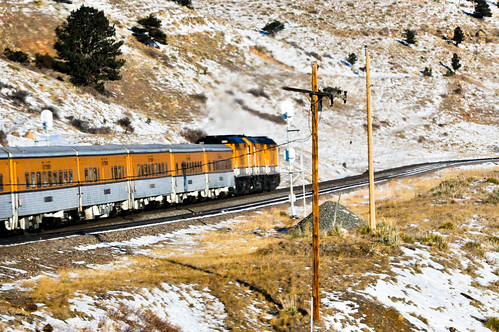 just recently learned that the Denver to Winter Park Ski Train, that has operated since 1940, was sold last spring and it's long run as a fixture in Colorado came to an end.
just recently learned that the Denver to Winter Park Ski Train, that has operated since 1940, was sold last spring and it's long run as a fixture in Colorado came to an end.But maybe not. Recent news articles (and discussion) indicate that service may be reimplemented with a new owner and partnership with Amtrak this winter.
Although I lived and skied in Colorado, I never took the ski train, although I know people who did.
According to the owner, the ski train never made money and its costs were escalating, making it even more unprofitable. It cost too much to run the train. Clearly, there is something wrong with this. It can't possibly cost more to carry several hundred people from Denver to Winter Park on a single--albeit large--vehicle than it would cost to have them all pile into individual cars and drive themselves in groups of twos and threes. And so it is true.
The problem is that the train is expected to support itself and its infrastructure while I-70 is paid for by everyone through their taxes. There isn't even a toll; it's a free road. Other costs of driving are lost as externalities--most glaringly the traffic delays that have become legion on weekends. When I was growing up, we could drive from Colorado Springs to Winter Park in about 2 1/2 hours.
 Now it takes that long from Denver, which is 50 miles closer.
Now it takes that long from Denver, which is 50 miles closer.Some have suggested adding a 3rd lane in each direction on I-70, which would cost more than $4 billion. Others have countered that it would be possible to implement high speed rail to alleviate the traffic for less than that. If I were betting, I'd probably bet on the highway, even though there are almost certainly several other solutions that would cost less. That's because until we can change the institutional and societal expectations that roads are "free" and other transportation is "subsidized," we'll keep building the roads, even if they are the least efficient solution.
So let's bring the ski train back, and let's subsidize it just enough to fill it to capacity every trip. And then let's add a second train 45 minutes later and fill it up, too. And then another. And we can have the drivers, whose trips are now made faster and easier, because there are several hundred fewer cars, help pay for the trains. That seems fair to me: we reduce traffic, pollution and stress for all, and everyone shares the costs and benefits.
================
(train photo by Zach Graves; I-70 traffic photo by Sarah McGee)




No comments:
Post a Comment